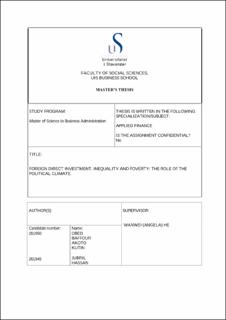| dc.description.abstract | The geographical region of Sub-Saharan Africa, South East Asia and Latin America host some of the poorest nations in the world. The problem with poverty emanates from its restriction to access to quality healthcare, quality education and an overall decline in the quality of life (Santiago, Wadsworth & Stump, 2011). Though data and trends of poverty suggest tremendous results in lifting people out of poverty, another cancer exists – inequality. The study employed a panel regression with data on 55 countries from Sub Saharan Africa, Latin America and South East Asia. The study showed that Foreign Direct Investment in poor countries exacerbates the problem of poverty and inequality. However, it is hampered by a sound political climate as the political climate tend to foster equality. Other variables such as Gross Capital Formation, Natural Resource Rent and the Growth in GDP per capita showed a significant relationship with inequality. The study revealed a natural resource curse. The recommendation of this study reechoes that of Gossel (2022) urging countries to move away from FDI in the extractive industry.
| |
